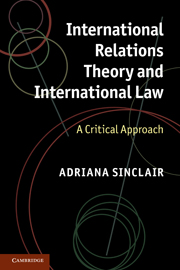Book contents
- Frontmatter
- Contents
- Acknowledgements
- Introduction
- 1 The theoretical foundations of constructivism and its treatment of law
- 2 Challenging the common sense idea of law
- 3 Introducing critical jurisprudence
- 4 Brown, desegregation and racism in America
- 5 Constructing rape
- 6 Law and normative backsliding
- Conclusion
- Bibliography
- Index
Introduction
Published online by Cambridge University Press: 05 June 2012
- Frontmatter
- Contents
- Acknowledgements
- Introduction
- 1 The theoretical foundations of constructivism and its treatment of law
- 2 Challenging the common sense idea of law
- 3 Introducing critical jurisprudence
- 4 Brown, desegregation and racism in America
- 5 Constructing rape
- 6 Law and normative backsliding
- Conclusion
- Bibliography
- Index
Summary
This is not a book that provides easy answers. It is a book that aims to challenge our unthinking assumptions about law. It has three audiences. Most obviously, this is a book for international relations (IR) theorists who work on international law. It is motivated by a desire to correct what I see as serious errors which produce poor theorisation of international law and its place in international politics. But it is also a book for all IR theorists. International law is now pervasive in international politics; it is hard to think of an area of international politics which remains unaffected by it. Witness how the world since 9/11 has been shaped by law. The language and conduct of politics has become increasingly legalised. But more than this, an understanding of law at a general level is crucial for all IR theorists because legalism percolates through every level of our society. It is both what we understand justice to be and how we achieve it. It frames our understanding of human relations and gives a language of rights with which to articulate them. The questions this book raises go the heart of jurisprudence and how we understand law’s relation to politics. Focusing on the cross-over between international law and international politics, this book will also provide some useful insights for lawyers concerning both international politics and how IR theorises it.
This book is divided into two halves: a theoretical first half followed by an empirical second. I will start by exploring IR theory’s best efforts to understand international law. This, I argue, is constructivism and chapter 1 is an in-depth engagement with constructivism’s theoretical foundations in the work of Nicholas Onuf and Friedrich Kratochwil. Their work also merits inclusion because it explicitly addresses the questions of law and international law and therefore offers two of the best accounts of international law in both constructivism and IR theory more broadly.
- Type
- Chapter
- Information
- International Relations Theory and International LawA Critical Approach, pp. 1 - 6Publisher: Cambridge University PressPrint publication year: 2010



